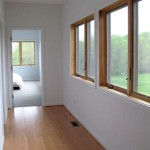Essential Aspects of Interior Wall Soundproofing for a Peaceful Home
Excessive noise can be a major disruption in our daily lives, especially within the confines of our own homes. Noise pollution can disturb sleep, hinder concentration, and create a stressful living environment. Fortunately, there are effective measures you can take to mitigate noise levels through interior wall soundproofing.
Identify Noise Sources
The first step in addressing noise issues is to identify the sources of unwanted sound. Common culprits include adjacent rooms, external traffic, noisy neighbors, and HVAC systems. Understanding the nature of the noise will help you determine the most suitable soundproofing solutions.
Mass and Density
Mass and density play a crucial role in soundproofing. Heavy, dense materials like concrete, drywall, or acoustic panels effectively absorb and block sound waves. Adding an extra layer of drywall or installing acoustic panels on existing walls can significantly reduce noise transmission.
Air Gaps and Isolation
Air gaps between multiple layers of materials create an acoustic barrier that disrupts sound propagation. Staggering studs, using resilient channels, or installing floating floors can create these air gaps and minimize noise transfer from one room to another.
Acoustic Sealants and Caulkings
Even small gaps or cracks in walls can allow sound to leak through. Sealing these gaps with acoustic sealants or caulkings significantly improves soundproofing. Apply them around pipes, electrical outlets, and other openings to prevent noise penetration.
Soundproofing Curtains and Drapes
Thick, heavy curtains or drapes can act as sound barriers by absorbing and reflecting sound waves. Choosing fabrics with high noise reduction coefficients (NRCs) will enhance their soundproofing capabilities. Installing them over windows and doorways can effectively reduce noise from outside sources.
Professional Soundproofing Systems
For more severe noise problems, consider installing professional soundproofing systems. These systems typically involve multi-layered construction with specialized soundproofing materials, such as acoustic insulation, sound barriers, and vibration damping compounds. They offer exceptional noise reduction but may be more expensive and require professional installation.
By implementing these interior wall soundproofing measures, you can create a more peaceful and serene living environment. Remember to tailor your approach to the specific noise sources and the desired level of noise reduction.

Wall Soundproofing How To Soundproof Your Netwell

How To Soundproof A Wall Materials For Soundproofing Walls

Wall Soundproofing How To Soundproof Your Netwell

How To Soundproof Interior Walls Made Of Drywall Ecohome

How To Soundproof A Wall Achieve Higher Stcs On Your Demising

Soundproofing Your Apartment The Myths What You Can Do

Soundproofing A Wall How To Soundproof Walls Mass Loaded Vinyl Manufacturer

Wall Soundproofing How To Soundproof Your Netwell

How To Soundproof A Stud Wall Noisestop Soundproofing Guide

What Are The Four Elements Of Soundproofing








